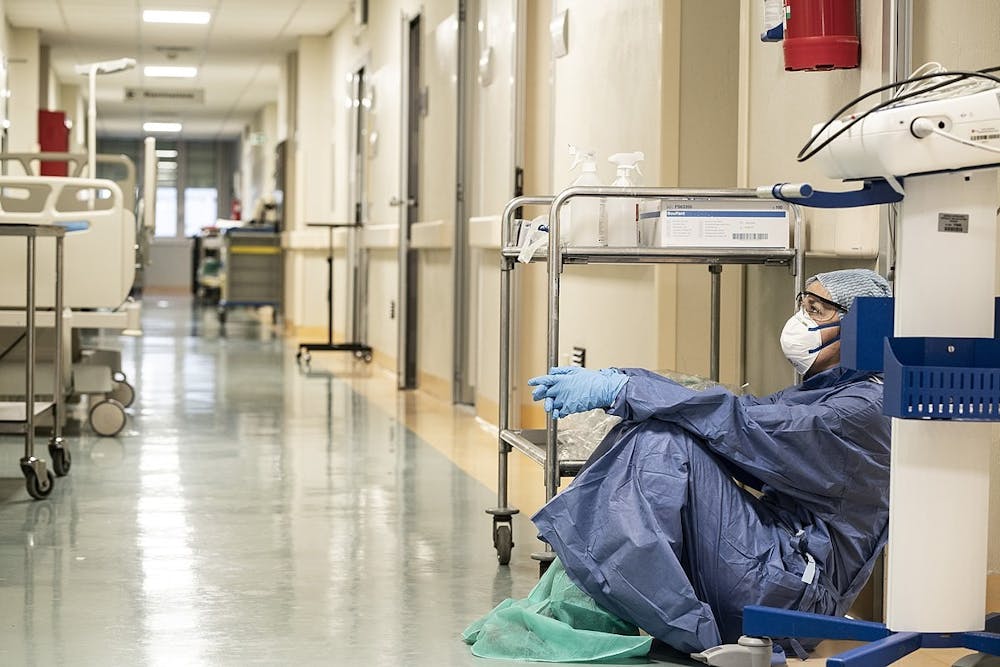Winter is an exciting time for most Americans, with many preparing for the bustle of the holiday season as early as the first weeks of November. This winter is particularly invigorating as millions of college students return home, communities continue to navigate the ever-changing landscape of a global pandemic and the nation recovers from the effects of a momentous presidential election. Indeed, this winter is undoubtedly a time of change. However, at least one thing remains constant — the persistent and increasing threat of COVID-19. As such, it is imperative that students recognize this threat — and the role they play in mitigating its effects — as we transition to life at home this winter.
To many students, it may seem as though the restrictions of the past eight months are finally subsiding. With recent COVID-19 vaccine trials yielding promising results and the momentary peril of dormwide lockdowns drifting further into the past, it is easy to imagine that the University has effectively curbed the spread of COVID-19. This mindset is only reinforced by the implementation of asymptomatic prevalence testing which, though certainly beneficial, may provide a false sense of security for students on Grounds who assume that their peers have tested negative for COVID-19. Even beyond these tangible suggestions of progress, however, is the fact that many Americans are simply tired of following COVID-19 restrictions. After eight months of masks, takeout boxes and classes on Zoom, many people — particularly college students — have had enough.
As our attitudes have changed, so too has the progression of COVID-19 — but only for the worse. As of Thursday, nationwide reports of new daily COVID-19 cases totalled more than 221,000, far surpassing the daily totals of late spring and early summer. Even more troubling, however, are recent death rates, which have reached totals of more than 3,100 per day in the United States. In response, governors nationwide have issued a plethora of orders tightening existing mask-wearing mandates, closing restaurants and schools and limiting in-person gatherings — Governor Ralph Northam included. In the University community, the average positive case rates rose steadily throughout early November — a rise made even more concerning by the fact that thousands of on-Grounds students have recently returned home for the holiday season.
Obviously, the pandemic is far from ending, although the attitudes of University students seem to suggest otherwise. As disclosed in a Nov. 15 email from Dean of Students Allen Groves, a number of off-Grounds gatherings occurred throughout Halloween weekend, with large numbers of students openly violating COVID-19 guidelines. Such occurrences are not an anomaly, however, with student attitudes toward COVID-19 growing more lenient as the semester progressed. Indeed, as students, we have grown accustomed to the frenzy of contact tracing, regular testing and the occasional positive case. Desensitized to the uncertainty of life in a pandemic, many students have convinced themselves that the worst of COVID-19 is over, instead choosing to live the college semester they once imagined. In doing so, however, they simultaneously fail to recognize the risk they pose to University students, faculty, staff and contracted workers — a risk that increases exponentially as many students travel home for the winter.
Beyond our own attitudes, however, are many situational factors that make the spread of COVID-19 even more formidable in the coming months. Unlike last spring and summer, we can no longer gather outdoors to evade viral transmission and, for many of us, have much larger networks than we did at the beginning of the pandemic. Even if we test negative for COVID-19 before traveling home for the winter, such a test only represents a single moment in time, a moment that quickly ends when we return to dorms, dining halls, restaurants and airports. Among those of us who have tested positive in the past, long-term immunity is not guaranteed and cannot be relied upon. Compounding this situation, widespread dissemination of a vaccine may still be months away and, until then, we must avoid the temptation to gather with family and friends.
Thus, it is imperative that we change our behavior before placing more communities at risk. The holiday season is a time of great celebration but, this winter, it must also be a time of great vigilance. As college students, we have a unique responsibility to protect our friends, families and communities this winter, regardless of how our attitudes on Grounds have changed this fall. Indeed, this holiday season, we must collectively check our COVID-19 complacency. This will translate to a holiday season that is far from ordinary — a holiday season defined in large part by continued mask-wearing, a lack of large gatherings and the absence of all nonessential travel. It is, after all, a matter of life and death.
Maddie Stokes is a Viewpoint Writer for The Cavalier Daily. She can be reached at opinion@cavalierdaily.com.
The opinions expressed in this column are not necessarily those of The Cavalier Daily. Columns represent the views of the authors alone.







